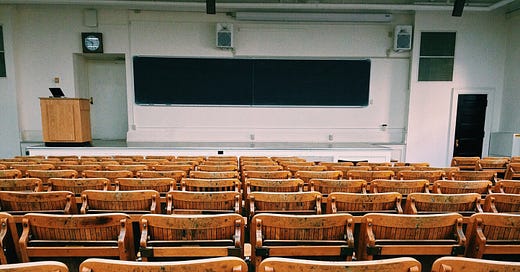Teachers, you are losing public trust
During one exhausting December week, I taught my class of 1st graders for five days straight with no more than a 15-minute break each day. My students arrived around 9am and left the classroom at around 3pm, and I had 15 measly minutes during the late morning, while they were at lunch, to visit the restroom and prepare whatever teaching materials were needed for the remainder of the school day. That was it. Being an elementary school teacher, one who taught all subject areas in a self-contained classroom, I was skilled at rationing my liquid consumption to manage the number of times I needed to go to the bathroom during the course of a day. But I had to be especially strict during this week—I was no doubt dehydrated for much of the week.
Many teachers had called in sick that week for reasons I do not recall, but in this particular school, as in many others, when a teacher calls in, the first option, before requesting from the district a substitute teacher, is to have one of the "specials" teachers fill in—P.E. teacher, music teacher (when we could manage to find, then keep, one), librarian, or Spanish teacher, in our case. When a specials teacher had to act as a substitute teacher, their P.E., Spanish, etc. class was cancelled for the day. Teachers wouldn't know that a given specials class was cancelled, eliminating our 40-minute prep if our students were scheduled to have that class, until we walked through the school door that day, at best, or until right before the bell rang for school to begin. We were left with little to no time to prepare any materials needed for the day that would require us to leave the classroom.
As a 1st grade teacher, I was in the luxurious position of having an aide that would come by every morning to gather any materials that I needed and to make any photocopies that I required, but she also often got pulled into classrooms to cover for absent teachers. And yes, if need be, I could call down to the office to request a warm, adult body stand in my classroom while I ran to the restroom, but when I would make such requests, the irritated sigh from the other end of the intercom indicated that the request was not welcomed.
This long week in December was the one and only week during my short teaching career that I seriously considered submitting a complaint to the teachers union. Our contract allowed elementary-age teachers four, 40-minute prep periods a week. This particular week, I got none. I had dealt with the other weeks that I had received less than four, but not zero, prep periods, and I dealt with the breach in my contract when 30+ kids started the school year in my class, or transferred in, when I was supposed to max out at 28. But, at this point, I was being pushed over the edge.
For most of my adult life, I have supported teachers unions. I knew that they offered me recourse when my apathetic principal seemed not to care about my well-being or success, and as a Chicago Public Schools teacher, I was paid well, comparatively. As I have gained more experience with the inner working of the public education system and the role of teachers unions, I have also developed critiques. But my critiques have never been so strongly against the Chicago Teachers Union in particular as they were last week. Although their primary role is to represent public school teachers, they also claim the mantle of doing what's in the best interest of kids. This has clearly not been the case during the course of the pandemic, however, they have fulfilled their primary duty to act in the interest of their constituents. Teachers voted not to return to school for nearly a week, after other massive disruptions to schooling over nearly two years. I am no longer a classroom teacher, but at this point in the pandemic, I cannot fathom casting such a vote. They are losing public trust, and at a rapid rate.
Public school teachers are often held up as heroes and saviors in our society. They are groomed in schools of education, and by media and public figures, to think of themselves as change agents who are single-handedly remedying social ills. The pedestal is too high to step onto, which is why teachers often get vilified for not living up to an unreasonably high standards, but many teachers embrace it nonetheless. But if public school teachers don't even think of themselves as an essential service to our society, do they deserve this pedestal to begin with? I get defensive when people who have never worked in a school attack teachers, but I'm having a hard time mustering a defense for them this time.




